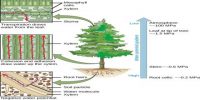The process how an embryo is formed from a gamete without it being fertilized is called parthenogenesis.
e.g. In plant – Spirogyra, Mucor, Fern etc. In animal – Bee, Wasp etc.
Usually parthenogenesis is of two types-
i) Haploid parthenogenesis and ii) Diploid parthenogenesis
Haploid parthenogenesis: When an embryo is formed from a sperm or from an unfertilitized ovum (n), the parthenogenesis is called haploid parthenogenesis.
e.g. Kakmasi plant.
Diploid parthenogenesis: Due to defective meiosis, a diploid female gametophyte (2n) is formed. When this diploid without being fertilized by sperm, gives rise to a new plant and it is called diploid parthenogenesis.
e.g. Parthennium argentatum.












